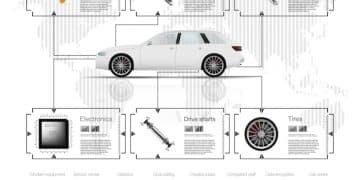How to negotiate the best car purchase price effectively

To negotiate the best car purchase price, research market trends, prepare effectively with detailed information, utilize strong negotiation techniques, and review contracts carefully to ensure optimal terms.
How to negotiate the best car purchase price might not be as intimidating as you think. Imagine driving off with your dream car while saving a significant amount of money. Curious how? Let’s dive in!
Understanding the car buying process
Understanding the car buying process can feel overwhelming, but it doesn’t have to be. Knowing the steps can make it much simpler and help you feel more confident. Let’s break down the process.
Step 1: Research Your Needs
Before diving into the market, think about what you need. This includes:
- Type of vehicle (sedan, SUV, etc.)
- Fuel efficiency
- Safety ratings
- Budget limitations
By narrowing down your options, you’ll make the next steps smoother.
Step 2: Determine Your Budget
Setting a realistic budget is crucial. Consider not just the purchase price, but also:
- Insurance costs
- Fuel prices
- Maintenance expenses
- Potential repairs
Having a clear budget helps in negotiations later.
Once you’ve established these basics, you can start exploring different makes and models online. Use various websites to compare prices and features. It’s also wise to visit local dealerships to get a feel for the cars you’re interested in.
Don’t forget to take a test drive! This interaction is key to understanding how a car feels and performs. You’ll want to ask questions about the vehicle’s history and performance.
Understanding the car buying process includes knowing the timing. Many people buy cars at the end of the month when dealers are eager to meet sales goals. Being aware of this can work to your advantage.
Researching car prices and market trends
Researching car prices and market trends is essential for making informed buying decisions. By understanding the market, you can negotiate better and avoid overpaying. Let’s explore how to do this effectively.
Use Online Resources
There are many online platforms to check prices and trends. Websites like Kelley Blue Book and Edmunds can provide valuable insights into:
- Average market prices for specific models
- Vehicle history reports
- Consumer reviews
- Market trends that affect prices
These resources help you set realistic expectations for your purchase.
Follow Industry News
Staying updated with automotive news can also help. Articles about new car releases, recalls, or economic changes impact car prices. Subscribe to automotive blogs or newsletters, which will keep you informed about:
- New technologies in cars
- Market demand and supply shifts
- Seasonal trends in buying
This knowledge can enhance your leverage during negotiations.
Aside from online research, visiting local dealerships can give you a feel for the cars. Talk to salespeople and ask about available deals and promotions. Also, keep an eye on social media ads as these often reflect current trends and pricing strategies.
Don’t forget to consider seasonal changes, too! For example, prices might drop at the end of the year when dealerships want to clear inventory. Understanding these aspects can lead to optimal timing for your purchase.
Effective negotiation tips and techniques

Effective negotiation tips and techniques can make a significant difference when buying a car. Knowing how to approach the negotiation table can lead to better prices and terms.
Do Your Homework
Before starting negotiations, gather as much information as possible about the vehicle you intend to buy. This includes:
- Market price comparisons
- Available discounts and incentives
- Similar makes and models on sale
This knowledge will empower you during discussions with the dealer.
Practice Your Offers
Consider starting negotiations by presenting a fair offer based on your research. Make your first offer lower than your target price to give yourself room to negotiate. Always be prepared to justify your offer with data. You can say something like, “I found this model listed for less at another dealership.” This shows that you are serious and informed.
A key part of negotiation is listening. Pay attention to the salesperson’s responses and be willing to adjust your approach based on their feedback. If they say they can’t meet your price, ask about alternatives or added incentives. This could include free maintenance or additional features.
Don’t hesitate to walk away if you feel pressured. Showing that you’re not afraid to leave can give you leverage. Remember, there will always be other cars and opportunities.
Finally, stay respectful and calm throughout the process. Maintaining a positive attitude can encourage cooperation, making it easier to find a common ground.
Common pitfalls to avoid during negotiations
Common pitfalls to avoid during negotiations can save you time and money. Being aware of these mistakes helps you make better decisions when purchasing a car. Let’s explore some key points.
Not Being Prepared
One of the biggest mistakes buyers make is entering negotiations without proper knowledge. Failing to research prices and market trends can lead to unfavorable deals. Always come prepared with:
- Pricing data from reputable sources
- Your budget limits
- Information on vehicle history
This preparation boosts your confidence and bargaining power.
Focusing Solely on Monthly Payments
Another pitfall is concentrating only on monthly payments instead of the total cost. Dealers often use low monthly payments to attract buyers, but this can result in a longer loan term and higher total costs. Always calculate the full price of the vehicle, including interest, fees, and additional charges.
Avoid getting emotionally attached to a specific car. When buyers become too invested in a single vehicle, they can overlook red flags or rush through negotiations. Keep an open mind about alternatives to maintain a competitive edge.
Another common mistake is failing to ask about additional fees. Always clarify any extra costs, such as dealer fees, documentation fees, and potential add-ons. Transparency about costs helps avoid surprises later on.
Lastly, surrendering too quickly when discussing offers can cost you. If the dealer’s first offer doesn’t meet your expectations, counter it rather than accepting it outright. Being assertive is key to ensuring you get the best deal possible.
How to finalize your car purchase contract
How to finalize your car purchase contract is a crucial step that shouldn’t be overlooked. Completing this process carefully ensures you are protected and understand your commitments.
Review All Terms
Before signing any contract, take the time to go through every detail. Look for:
- Total purchase price, including taxes and fees
- Payment terms and interest rates
- Warranty information
- Any additional fees or charges
Identify any discrepancies compared to what was discussed during negotiations. If anything seems unclear, don’t hesitate to ask questions.
Understand the Warranty
It’s important to know the warranty terms of your new vehicle. This includes:
- Length of the warranty
- What parts are covered
- How to claim warranty services
Understanding these details can save you money on repairs in the future.
Make sure to check the financing options. If you’re taking out a loan, read the loan agreement carefully. Look at the interest rate and ensure it matches what you agreed upon. Verify how long you will be paying the loan and whether there are penalties for early repayment.
When you’re ready to sign the contract, ensure all required signatures are in place. Keep copies of everything for your records, including the signed contract, any communication with the dealership, and payment receipts.
Finally, remember to take your time during this final step. Rushing can lead to mistakes or misunderstandings. If you feel uncertain about any aspect of the contract, consult with someone knowledgeable or consider taking an extra day to think it over.
FAQ – Common Questions About Negotiating Car Purchases
What should I research before negotiating a car purchase?
You should research market prices, vehicle history, and available discounts to strengthen your negotiating position.
How can I avoid pitfalls during negotiations?
Being prepared, asking detailed questions, and knowing when to walk away can help you avoid common mistakes.
What are some effective negotiation techniques?
Start with a lower offer, listen to the salesperson, and remain calm and polite throughout the process.
Why is it important to review the purchase contract carefully?
Reviewing the contract ensures you fully understand the terms, including warranties and total costs, protecting you from unexpected issues.





